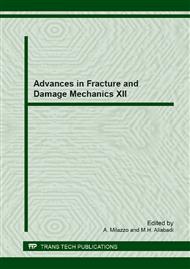p.357
p.361
p.365
p.369
p.373
p.377
p.381
p.385
p.389
Propagation Behavior of Naturally Initiated Small Crack in Austenitic Heat Resistant Steel under Thermo-Mechanical Fatigue Loading
Abstract:
In this paper, the crack propagation behavior of naturally initiated small crack in in low-carbon/medium-nitrogen 316 stainless steel under thermo-mechanical fatigue loading was investigated. The experimental results indicated that the importance of the investigation of small crack propagation behavior because the information on the basis of physically long crack growth rate provides a dangerous evaluation on reliability to actual components. The small crack exhibits high growth rate under the In-phase TMF loading because of irreversible creep and plastic strains. However, the growth rates of small crack under the Out-of-phase TMF loading were lower because the effect of creep deformation became negligible in such condition.
Info:
Periodical:
Pages:
373-376
Citation:
Online since:
September 2013
Authors:
Price:
Сopyright:
© 2014 Trans Tech Publications Ltd. All Rights Reserved
Share:
Citation:


